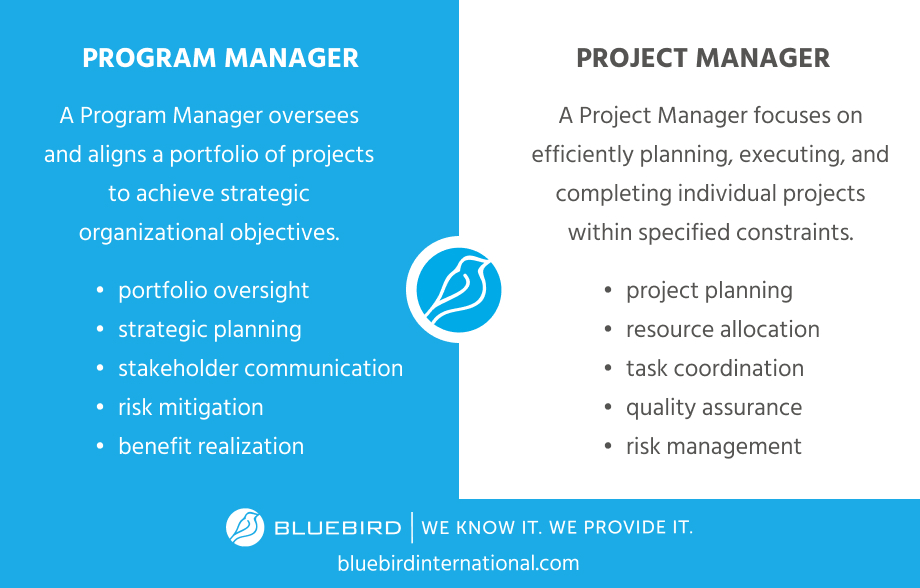Program Manager vs Project Manager: a comparison of responsibilities, required skills, career progression, salaries, and more!
More...
Curious about the differences between the role of a Program Manager and a Project Manager? These roles, while closely related and occasionally overlapping, serve unique purposes within an organization.
Program Managers oversee a collection of projects—often referred to as a program—and ensure that the program’s strategic objectives are met. In contrast, Project Managers primarily concentrate on the planning, executing, and closing of individual projects, ensuring that each one aligns with the company’s overall objectives.
Let’s see the differences (and similarities) in detail, followed by extra info on responsibilities, required skills, career progression, salaries, and more!

Program Manager vs Project Manager: Key Differences
While both roles are integral to management, their primary focuses and responsibilities diverge based on the specific objectives they aim to achieve.
Program Managers navigate with a broader perspective, working not merely on individual projects but managing a portfolio of related projects, or a 'program'.
The focus here isn’t only on the success of individual projects; it’s about ensuring that the collective outcomes of all projects under the program positively contribute to the organization's strategic goals. While individual projects within the program have unique challenges and milestones, Program Managers emphasize the synergy of projects to realize larger organizational objectives.
On the flip side, Project Managers focus their attention on specific, individual projects. With a straightforward goal, they work to ensure that projects are completed on time, within the agreed scope, and budget.
Every project is seen as a distinct endeavor with its set of objectives, timelines, and resources, and the Project Manager is entrenched in detailed planning, vigilant monitoring, and precise execution from start to finish.
In essence, while Program Managers ensure that a collective set of projects aligns with and contributes to the organization's overarching goals, Project Managers are zeroed in on the specifics and successful completion of single projects.
Takeaways:
Program Manager Responsibilities
1. Overseeing a Portfolio of Projects = Program
Beyond the completion of individual projects, Program Managers focus on the comprehensive success of the entire program. They work to guarantee that the collective benefits from various projects are in sync with broader organizational strategies.
2. Focus on Strategy
Program Managers craft the roadmap for the program. They categorize projects according to strategic importance, directing efforts and resources to areas offering maximum value.
3. Stakeholder Management
Engaging in regular and clear communication with stakeholders is crucial for Program Managers. They navigate through concerns, manage expectations, and work to align everyone involved with the intended course of the program.
4. Program-level Risks and Benefits
They pinpoint risks that may impact the program and devise strategies for mitigation while concurrently identifying and capitalizing on opportunities to enhance benefits across all projects.
In a Fintech setting, for example, Program Managers might oversee a program focused on launching several new digital payment solutions. One identified risk could be the rapid changes in regulatory compliance in different markets where the solutions are planned to be launched. Non-compliance risk is significant, as it might not only incur fines but also damage the company’s reputation, affecting all projects under the program.
To mitigate this, the Program Manager proactively engages with legal and compliance experts to understand the regulatory landscape, ensures that each project within the program adheres to the current laws and regulations, and builds a framework for adapting to future regulatory changes efficiently.
On the benefits side, the Program Manager identifies the opportunity to integrate advanced data analytics and fraud detection mechanisms across all digital payment projects, enhancing the security and appeal of the solutions.
Project Manager Responsibilities
1. Overseeing Individual Projects
The success of each project is under the stewardship of the Project Manager. They guide the project's course to ensure alignment with its unique objectives and broader company goals.
2. Detailed Planning
Project Managers develop and implement meticulously devised plans for every phase of the project, from start to finish.
3. Resource Allocation
Project Managers must identify and efficiently use necessary resources (both human and material).
4. Focus on Delivery
Beyond the realm of planning, their fundamental objective is the on-time and successful completion of the project while meeting quality standards and staying within budget.
Program Manager vs Project Manager: Necessary Skills
While both roles require strong leadership and strategic thinking, Program Managers need a broader vision and stakeholder management skills due to the extensive scope of programs.
In contrast, Project Managers require a deeper focus on organizational and risk management skills, as well as proficiency in specific tools and methodologies to ensure the smooth execution of individual projects.
The skill sets of both roles are complementary, working together to ensure both individual project success and the realization of broader program objectives.
Let’s see the required skill set for each!
Program Manager Skills
Program Managers need a distinct set of skills to successfully oversee entire programs consisting of various related projects.
Strategic Vision: Ability to develop and convey a clear and inspiring picture of the future program outcomes, aligned with organizational strategies.
Leadership Skills: Capacity to motivate, guide, and manage both the program team and stakeholders while navigating through the challenges to achieve program objectives.
Stakeholder Management Skills: Effective communication and negotiation skills to engage and align various stakeholders, ensuring their buy-in and support for the program.
Ability to Identify and Realize Program-level Benefits: Skill in pinpointing and capitalizing on the collective benefits that the program can bring to the organization, going beyond the success of individual projects.
Financial Acumen: Understanding of budgeting and financial analysis to ensure the program stays within budget while maximizing its financial benefits.
Project Manager Skills
Project Managers, while sharing some skills with Program Managers, also need unique competencies to effectively plan, execute, and close individual projects. Some of these are:
Organizational Skills: Ability to plan and oversee projects down to the detail, ensuring every aspect is in place for successful completion.
Leadership Skills: Motivating and leading project teams through the lifecycle of a project, handling any issues or changes that occur efficiently.
Risk Management Skills: Proficient in identifying, assessing, and mitigating risks that might threaten the project's success at any stage.
Proficiency in Project Management Tools and Methodologies: Familiarity with various project management tools and methodologies (like Agile, Scrum, or Waterfall) that aid in planning, executing, and monitoring project progress.
Time Management: Efficiently allocating and utilizing time and resources, ensuring project deadlines are met without compromising on quality.

Program Manager vs Project Manager: A Fintech Example
So how do the two roles differ in the same organization? Let’s consider a Fintech company that provides a suite of financial services, including peer-to-peer payments, investment platforms, and personal finance management. This company is launching a new initiative to integrate cryptocurrency transactions into their existing services.
Program Manager's Role at the Organization
The Program Manager in this scenario oversees the entire initiative of integrating cryptocurrency transactions.
Responsibilities:
1. Develops a comprehensive program strategy that aligns with the company’s objectives of diversifying financial services.
2. Coordinates with various project managers responsible for different components, such as blockchain integration, user interface development, and regulatory compliance.
3. Engages with stakeholders including investors, board members, and partners, communicating the program’s progress and addressing concerns.
4. Identifies opportunities to leverage resources and knowledge across projects, for instance, utilizing the same blockchain infrastructure for both peer-to-peer payments and investment services.
5. Anticipates and mitigates risks at the program level, such as market fluctuations in cryptocurrency values or changes in regulatory environments.
Project Manager’s Role at the Organization
A Project Manager within this initiative might be assigned to handle the integration of blockchain technology into the peer-to-peer payment service.
Responsibilities:
1. Plans the project meticulously, outlining the tasks required for blockchain integration and allocating resources accordingly.
2. Leads the project team, consisting of software developers, UX designers, and quality assurance testers, directing their daily operations and addressing any issues.
3. Coordinates with the legal department to understand and comply with regulations pertaining to cryptocurrency transactions.
4. Implements risk mitigation strategies at the project level, for example, developing security protocols to protect users’ cryptocurrency wallets.
5. Ensures the project stays within budget and is completed on time, regularly reporting progress to the Program Manager.
Collaboration between Program Manager and Project Manager
In this example scenario, the Program Manager and Project Manager work collaboratively. The Project Manager ensures the Program Manager is informed about the project's progress and challenges.
In turn, the Program Manager provides support and strategic direction, helping navigate obstacles that the project might encounter, and ensuring alignment with the broader program objectives.
For instance, if there is a delay in the blockchain integration project due to unforeseen technical challenges, the Program Manager might need to adjust the program timeline and communicate these changes to stakeholders.

Program Manager Vs Project Manager: Role Overlaps and Variations
Overlap between Program and Project Managers is common, primarily influenced by organizational size, project complexity, industry norms, and career transitions.
Smaller organizations and startups frequently witness role blending due to limited resources, requiring individuals to assume multiple responsibilities. In contrast, larger corporations, handling more intricate projects, generally maintain distinct roles to focus on specialized tasks effectively.
Industries prioritizing agility, like tech and startups, often necessitate professionals to adopt versatile roles, whereas traditional sectors usually uphold clear demarcations between the two positions.
Program Manager Vs Project Manager: Career progression
Career Progression for Program Managers
- 1Entry-Level/Pre-Program Management Roles: Before becoming Program Managers, individuals often start in roles that allow them to gain experience with project oversight and strategy formulation, such as Project Managers, Analysts, or Consultants. They might also come from technical backgrounds like Software Developers or Engineers, particularly if they're working within tech companies.
- 2Junior Program Manager: In this phase, individuals take on responsibility for smaller or less complex programs. They might also work as assistants to more experienced Program Managers, learning the ropes while providing valuable support.
- 3Program Manager: With some experience, they manage more significant or complex programs, overseeing multiple projects and ensuring alignment with organizational strategies.
- 4Senior Program Manager/Program Director: These seasoned professionals take charge of crucial programs, often managing other Program Managers and working closely with organizational leadership to shape and execute strategic initiatives.
- 5VP of Programs/Chief Program Officer (CPO): At this executive level, individuals are responsible for the entire portfolio of programs within an organization, helping to guide its strategic direction and ensuring that all programs contribute to the overarching goals.
Career Progression for Project Managers
- 1Entry-Level/Pre-Project Management Roles: Individuals might start as Project Coordinators, Project Analysts, or in operational roles where they gain experience in organizing, planning, and supporting projects.
- 2Junior Project Manager: Here, they take on more responsibility, overseeing smaller projects or assisting experienced Project Managers.
- 3Project Manager: With the requisite experience, they manage complete projects, taking responsibility from inception through to completion.
- 4Senior Project Manager/Project Director: Managing larger or more complex projects, they may also lead teams of Project Managers, contributing significantly to achieving organizational objectives.
- 5VP of Project Management: In executive roles, they oversee the organization’s entire project management function, providing strategic direction and ensuring that projects align with and support the overall business goals.
US Salary Comparison
Generally speaking, Program Managers tend to earn higher salaries than Project Managers at similar experience levels, reflecting the broader scope and higher level of responsibility associated with their role.
In the United States, entry-level Project Managers can expect to earn a salary starting around $60,000 annually, while their Program Manager counterparts might start at approximately $80,000. As professionals advance in their careers, these numbers increase significantly.
Experienced Project Managers can earn between $80,000 to over $120,000 per year, while seasoned Program Managers often see salaries ranging from $110,000 to upwards of $160,000 annually.
And as always: In both roles, additional factors (such as the cost of living in a particular location, the size and industry of the employer, and the individual's education and certifications) can significantly influence these figures.
Frequently Asked Questions
Q: What educational background is necessary for Program and Project Managers?
Both roles typically require a bachelor’s degree in business, management, or a related field. Advanced degrees like an MBA or Master’s in Project or Program Management can be advantageous. Additional qualifications and certifications, such as PMP (Project Management Professional) for Project Managers or PgMP (Program Management Professional) for Program Managers, can also be beneficial.
Q: How do Program and Project Managers interact with organizational leadership?
Program Managers often have more frequent interactions with senior leadership and executives, as they need to align the program's strategic objectives with the organization's goals. Project Managers might communicate with upper management but typically report to Program Managers or other middle-management roles.
Q: What metrics are used to evaluate the performance of Program and Project Managers?
Project Managers are commonly evaluated based on their ability to complete projects on time, within scope, and on budget, while maintaining quality standards. Program Managers are assessed on the overall health and success of the program, the alignment of the program with strategic objectives, and the value the program delivers to the organization.
Q: Are there distinctions in these roles across different sectors or industries?
While the core responsibilities remain similar, the application of these roles can vary across industries. For example, in the tech sector, Project Managers might work on software development projects, while Program Managers oversee a suite of such projects aligned with a tech strategy.
Q: What challenges are typically associated with each role?
Program Managers may face challenges in aligning multiple projects with organizational strategy, managing various stakeholders, and ensuring long-term benefits. Project Managers often deal with issues related to resource allocation, timeline adherence, and managing team dynamics.
Q: Is transitioning from a Project Manager role to a Program Manager role common, and how feasible is it?
Transitioning is not uncommon and is feasible, as there is a skill overlap between the two roles. Experience as a Project Manager can be valuable for a Program Manager role, as it provides a deep understanding of project-level challenges and management techniques. Continuous learning, additional certifications, and experience with strategic planning further facilitate this transition.
We hope you enjoyed our article on the differences between the role of a Program Manager and a Project Manager.
If your company is looking for IT professionals and you are interested in IT recruitment or IT staff augmentation, please contact us and we will be happy to help you find the right person for the job.
To be the first to know about our latest blog posts, follow us on LinkedIn and Facebook!